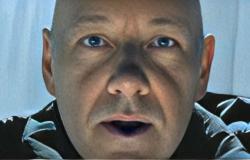Ferzan Özpetek needs no introduction and, in its fourth title in the bookstore, the director he confirms himself to be highly appreciated also in his role as novelist.
In Hidden heart (Mondadori), having been in the rankings for almost two months now, Özpetek is back in his own Romethe city where everyone destinies intersectto tell the story of a dream in the drawer and of a secret waiting to be revealed. The protagonist, Alicearrives in the Capital of early nineties thanks to a generous and unexpected inheritance; with her, a heavy burden of pain that she hopes to leave behind and the desire to become an actress. The discovery of an old atelier remained closed for years will lead her to follow the trail of a hidden love story between paintings and diary pages, discovering something more about herself day by day.
Özpetek, interviewed by ilLibraio.it on the occasion of the book’s release, he spoke to us about his relationship with writing and art.
Let’s start from the beginning: how did the idea for the novel come about?
“I was inspired by the story of a friend of mine, an actress, who, like the protagonist Alice, as a child met an aunt who lived in Rome, an extroverted woman who she was fond of and with whom she spoke several times in the following years”.
But?
“Unlike what happens in the book, she was a ‘blood’ aunt. This aunt bequeathed her an apartment in Rome and, thanks to the apartment, which was also quite large, she moved to Rome, rented out rooms and began her career as an actress. In short, she changed her life. I started from this story and then built a whole other story.”
It may also interest you

What does novel writing give you compared to film writing? Do you find any substantial differences in these two modes of narration?
“When you write a novel, you do it alone. I wake up quite early, at 6.30-7, and I start writing, sometimes just four or five pages, which other times maybe become ten. And this solitary activity amuses me. Then I send what I wrote to my editor, Nicoletta Lazzari, who collects everything until a moment of in-person discussion, in which we reread together and talk about it. Instead, when working on a film, the screenplay is written with other screenwriters and there are various moments of sharing with the crew and the actors, in short it is more of a team effort. In reality, in both cases what interests me is the sharing with the reader or spectator which, in the end, is the same. In my life and career, sharing emotions and thoughts with others has always been fundamental. When I shoot a scene in a film I always think about the spectators, and I wonder if people I don’t know will feel the same emotions I felt, and the same thing happens when I write a book.”
Discover our Telegram channel
In Hidden heart a theme dear to her returns: that of family. We find ourselves faced with a family which, at least before the final turning point, is a source of problems and strong negativity, while the positive stimulus to life comes from those who are outside it.
“In this novel we do not find a ‘normal’ family, but with profound problems, which condition the behavior of the characters: from Alice’s relationship with her natural mother, to that with her aunt Irene, who is not really her aunt, but indicates the street. I too, in my life, have had people who guided me and gave me advice, I had various ‘aunts Irene’, starting with my mother herself. So in this story I wanted to recreate this type of bond. Fate also plays a role.”
How?
“Negative events or sorrows then reveal a positive side. And in fact, in the final twist, a few pages from the end, the reader understands the meaning of the whole novel: it’s something that many readers told me they appreciated.”
Discover our Linkedin page
Acting, painting… in Hidden heart artistic expression is a fundamental part of the construction of individuality, a balm but also a source of pain.
“Before making films, when I was still at university and had been in Italy for three years, I argued a lot with my father, who at a certain point stopped giving me financial support. So I went to work for a framer, like Tancredi [un personaggio del romanzo, n.d.r.], and during my breaks I painted on the wrapping paper of the paintings. Customers, seeing these works of mine, began to buy it. I became a sort of improvised painter. I have made many and sold many (even that of You are ignorant it’s a painting of mine), for about two years.”
And then?
“I had the opportunity to work with Massimo Troisi, and from painting I moved on to cinema, but even now there are people who write to me to tell me that they have a painting of mine at home. For me the arts have always been very linked to each other, and the figurative side of painting, ultimately, also returns in the images of films and novels”.
There is another hidden character: Rome, a city that embodies both possibility and tragedy. That Rome is that of Hidden heart?
“I would have liked to set the novel in the Rome of the Seventies, the city where I arrived as a young man, with great dreams and curiosity, and which I loved. It was an amazing city, with very open-minded people. Instead, then, I preferred to set the story in the Eighties-Nineties, in the area where I live, that of Campo dei Fiori, but that too is a Rome that I lived and that I remember well, so I told with great ease the life of that period. A different life than today, with different rhythms, but Rome is still wonderful, it is the city where I chose to stop.”
In fact, thinking about the society that is the backdrop to the story, do you find any substantial differences with today’s Italy?
“There is an enormous difference, which however I don’t think depends on people, even if the pandemic has made them more irritable, impatient and aggressive…, but on how communication and our way of life have changed, with the internet and smartphones. Meeting each other in person or through a screen is very different, once upon a time we met people on the street, at dinner, we shared many more aspects of life. Today many friendships, but also several love stories, are experienced through the mobile phone. If Alice had arrived in Rome today, her story would have been completely different.”
Do you find that our everyday life would have impoverished the story of the novel?
“Yes, I should have told the story in a completely different way. Meetings, acquaintances, but also job searches would have been mediated by the internet. Alice would have controlled everything from a screen, instead of walking around, responding to ads, receiving information from people.”






